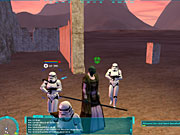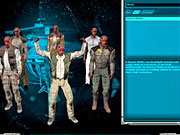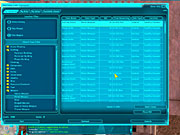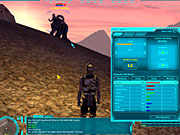Though massively multiplayer online role-playing games have been around for years, none to date have been as highly anticipated as Star Wars Galaxies. The excitement over the game was for fairly obvious reasons: The Star Wars universe seemed like it would be the perfect setting for such a game, and Star Wars Galaxies promised to be more than just EverQuest in space--it wouldn't be yet another online RPG where the gameplay revolved almost exclusively around killing monsters and gaining levels, but would instead offer numerous interesting non-combat-oriented player professions. At any rate, Galaxies is finally here, and it's not the life-changing event that some prospective players convinced themselves it would be. It actually fits squarely into the mold of numerous other games of this type, only it looks better, features authentic Star Wars creatures and characters, and has a number of interface enhancements not found in previous online RPGs. In the wake of the game's release, a number of key features are still in development (namely, player-driven cities, mounts, and vehicles), and the existing game content isn't all that much different or better than what's available in other, similar games. Then again, Star Wars Galaxies does have Star Wars going for it.

Star Wars Galaxies lets you create a character by choosing from male or female versions of eight different Star Wars races, including humans and wookiees, as well as the fish-faced mon calamari, the bug-eyed rodians, and more. Typically, your choice of race affects your character's proficiencies--for example, wookiees are very strong, while mon calamari are smarter than average--but in practice, your choice of race is mostly superficial. When creating your character, you have a lot of control over the shape of his or her face, and you can also adjust his or her body type, so you can make a rather distinctive-looking character--and that's a big part of Star Wars Galaxies' appeal. The game prevents you from naming your character after anyone from the Star Wars canon, though you should still expect to see many in-game wookiees with names played off Chewbacca and in-game rodians with names played off Greedo, and so forth.
The most important part of the character creation process is choosing your starting profession, which is basically your character class. The selection includes the artisan, the brawler, the entertainer, the marksman, the medic, and the scout. The brawler and the marksman are traditional combat-oriented classes, focusing on melee and ranged combat, respectively. The medic and the entertainer are functionally equivalent to healers. The artisan's job revolves around crafting various objects, from weapons to furniture, and the scout is a sort of adventurer/explorer capable of building traps, setting up camp, and extracting resources from slain creatures.
These initial professions determine the core skills you'll have at your disposal (though you may opt to learn other professions' novice skills as well, if you wish). You then grow your character not by gaining generic experience points like in other games, but primarily by gaining experience in whichever skills are most important to your character by using those specific skills repeatedly. For example, if a brawler fights unarmed, he or she will gain experience in unarmed combat. The starting professions actually branch off into more than 20 different advanced professions, which become available after you master any of the skill paths of the starting profession. So, when that brawler gains four ranks in unarmed combat, he or she may then qualify to become a Teräs Käsi artist--the Star Wars equivalent of a martial artist. Theoretically, then, there are multiple viable paths for every starting profession. However, while the early going is relatively brisk for all the professions, as you gain skill ranks, your advancement will slow to a crawl. You can expect to spend many dozens of hours repeating the same types of actions over and over before you can reach the advanced classes, especially the advanced hybrid classes, which require mastery of several professions' core skills.

Star Wars Galaxies was designed to make all the starting professions essential to the game, basically because brawlers, marksmen, and scouts--the obvious starting choices for many players--need medics, entertainers, and artisans to heal them and make them better weapons and armor. None of the professions is entirely self-sufficient, so this forces players to interact. The system of gaining experience in the specific skill you're using also makes a lot of sense--in other games, a character who wishes to become a master craftsman might still need to go out of his or her way to kill a bunch of monsters, whereas here, artisans, entertainers, and medics can ply their trades and improve their skills far from danger.
The problem is these non-combat-oriented classes can be really quite boring to play, particularly the entertainer and the medic. For example, an entertainer's purpose in Star Wars Galaxies is to cure fighting classes of their battle fatigue and their mental weariness, which are essentially gameplay contrivances that force characters to head back to town after they've been out fighting for a while. Entertainers do this literally by breaking into song or dance at a cantina or a theater. The character begins dancing or playing a musical instrument, and the player may perform various flourishes that cost stamina but give you a bit more experience. The entertainer gains experience faster if more people are actively watching or listening to him or her.
It's certainly possible that someone could really get into role-playing as an entertainer, and maybe try to start a band with other like-minded players. Star Wars Galaxies tries hard to bring you face-to-face with other players, and it includes a system that helps you find players with similar interests. But the gameplay itself--not just for entertainers but for most of the professions--is repetitive, time-consuming, and often simply unexciting. That's partly because, even though a character can theoretically have skills from other professions, improving your character in just one set of skills is so time-consuming that you'll likely feel confined to focusing your character's development on one area at a time.

In most online RPGs, characters have hit points that represent how much damage they can soak up before they die, magic points that represent how many spells they can cast before they have to recharge their batteries, and maybe stamina points that represent how long they can sprint or use other special physical abilities. Galaxies complicates the formula by expanding each of these conventional metrics into three separate meters, for a grand total of nine different meters you need to worry about.
The three sets of meters do roughly correspond to your health, your mental ability, and your stamina--only, for each category, you have a statistic for how quickly you regenerate your energy in that category and a statistic for how rapidly you drain points from that category when you use certain special abilities. Galaxies ultimately ties all this into your physical condition by including a location-based damage system, whereby strikes to your head affect your mental pool, strikes to your legs affect your stamina (or "action," as it's called here), and strikes to your arms or body affect your health. If any of the pools is depleted, you'll be knocked unconscious and will be vulnerable to being killed (though not permanently). Experienced fighters may therefore attack their enemies' most vulnerable parts to bring them down as quickly as possible.
The catch is that using special abilities also drains these pools. So, if a marksman wants to use a special shot of some sort, it will drain his or her action pool, in much the same way as a womp rat bite to the leg would. Therefore, each time you use your character's special abilities in Star Wars Galaxies, you get closer to death's door. Furthermore, you can sometimes sustain semi-permanent wounds to one of your nine attributes, slightly reducing your maximum point total for that category. Over time, such wounds can noticeably impact your character's abilities, so you'll often need to find a medic to heal your wounds, much like how you'd look for an entertainer to cure your battle fatigue. When you die in Galaxies, you sustain heavy wounds to all your attributes, which basically forces you to sit tight in an infirmary for a while while medics heal you back up. You aren't punished with an experience loss, but you end up losing a bunch of valuable time, and will probably need to trudge back to your corpse unless you paid to have your belongings insured. All this stuff about the nine attributes, which the manual calls the HAM system (health, action, mind), is convoluted and doesn't really improve on the conventions of the genre, and instead simply forces fighting characters--and medics--to worry about three different types of hit point meters instead of just one.

It's easy to get into the combat in Star Wars Galaxies. Fighting characters need only venture a few meters out of any of the numerous starting locations on the various starting planets before they'll come across all sorts of critters that can be killed for experience points. Transitions from towns into wilderness are handled seamlessly--loading times occur only between major areas, such as if you take a shuttle to another planet. The combat looks more action-packed than the combat of most other online RPGs, which is great. Melee characters dance about in fighting stances and perform a few different types of attacks, rather than just one attack animation over and over. Marksmen let loose with a flurry of Star Wars energy bolts each time they attack, and they can keep firing away while an opponent is giving chase. Marksmen can also fire while crouching or prone, which improves their accuracy, though terrain features such as shooting from behind cover or from a raised position unfortunately have no effect.
As in Dark Age of Camelot, Galaxies' fighting characters have access to various special abilities that deal more damage or hinder their enemies' abilities in some way, and they gain new abilities as they improve their skills. Individual characters or groups can take on randomized, cookie-cutter missions that involve either delivering an item or destroying a monster-generating object of some sort. These missions, repetitive as they are, are the best way to earn money, and can make for some relatively entertaining hack-and-slash adventures. But ultimately, the game's combat isn't really any better than what's been seen in numerous other games of this nature. So the gameplay of the fighting professions can be just as repetitive and uneventful as that of the non-fighting professions, though there's inherently more excitement to be found in slugging it out with Jabba the Hutt's goons, for example, than in dancing at the cantina or making your hundredth survival knife. Then again, in Galaxies, skilled artisans can make objects of superior quality and then name their creations, so this type of work is more appealing in Galaxies--and more complex, since you need to survey for and dig up the resources that you need--than in many other online RPGs.
Galaxies does a fairly good job of pointing you in the right direction. There's an optional step-by-step tutorial that walks you through the game's complex interface and explains your character's key abilities using clear voice-over and pop-up help screens. The game comes with a nearly-200-page manual that also makes for pretty good reference material. The interface itself, though it takes a few hours to get used to (especially when trying to figure out skills like surveying and crafting), is very powerful. You can easily locate and set waypoints to any area of interest near your character. Looking for the cantina in Mos Espa? Need to find the nearest city on Naboo? The interface puts all this information just a few keystrokes away. So, if you're a veteran of other online RPGs, you'll be pleased to know that the days of wandering through towns looking for shops and shouting for healers are gone with Star Wars Galaxies.

Speaking of shops, part of the reason you won't be looking for shops in Galaxies is because there basically aren't any, other than a few junk dealers, who mostly refuse to buy any of your stuff anyway. Instead, the game has a player-driven economy that's accessible through bazaar terminals, which let you bid on items put up for auction by other players, instantly buy items put up for sale, or post your own sales or auctions, or through player-made vendors, which perform similar transactions. There's currently a rather limited variety of goods available, as brawlers and marksmen are relegated to just a few basic types of weapons and armor, while other categories have no items posted for sale at all.
It's possible that players just haven't advanced far enough to get to some of the better items and equipment yet, but it's more likely that Star Wars Galaxies just doesn't have a ton of real content in it at this point. So as you kill the thousandth womp rat or dance the rhythm dance for the thousandth time, you may find yourself wondering what the eventual goal of all your efforts will be. After all, the world of the game is very vast, but feels quite empty. One option is to side with either the rebel alliance or the empire, and you can take on missions for either side, though currently, there isn't a clear rebel vs. empire conflict at work. LucasArts promises that story events will unfold over the life of the game, however.
In any event, the big question with Galaxies and with all online RPGs is: Are these games supposed to be fun, entertaining, and rewarding in and of themselves, or are you yourself supposed to provide the fun by role-playing a unique character and really getting into the whole experience? The answer is the former, because it's much harder to really get into a game when it isn't fun, entertaining, and rewarding by itself. Galaxies isn't all these things to all its players, at least not yet, even if it gives a good first impression, thanks to its impressive visuals, authentic Star Wars music and sound effects, and seeming depth of play. As mentioned, core features such as player-run cities and player-owned mounts and vehicles still aren't in the game. Players have yet to discover any way to harness the power of the Force in the game, leading many to believe that it's yet another feature still in the works. What is Galaxies today? A better-looking version of EverQuest with a better interface but far, far less content. The game also has plenty of noticeable bugs, though thankfully most of these are superficial or just mildly annoying. The thing that EverQuest still has on most other online RPGs is its very rich variety of content and its deep high-level combat system. Other games, like Dark Age of Camelot, also offer complex player vs. player gameplay at high levels, though player vs. player combat in Galaxies is relegated only to consensual duels and some rebel vs. empire skirmishes for the moment.

Galaxies does look great, though it demands powerful hardware. Its towns are already highly populated, and in them, system performance, even on top-of-the-line machines, can slow to a crawl. Other than that, the game does look like Star Wars, and the numerous starting locations look convincingly like their theatrical counterparts, or at least like part of the same universe. The player characters are detailed and look good, and you'll see plenty of other recognizable Star Wars creatures as you walk about town and explore the gameworld, as shuttles and imperial fighters and such go flying across the sky. The audio in Galaxies is also quite good, featuring a dynamic musical score based on John Williams' orchestral themes for the films, as well as plenty of Star Wars-style sound effects. The sounds themselves aren't all that great, since as with other online RPGs, most creatures and enemies just emit the same grunt over and over. But Galaxies certainly does offer some impressive production values overall.
A short while after the game's release, there's a lot of breadth to Star Wars Galaxies, but there isn't a lot of depth. The novelty of the online RPG genre has worn off for many people, who are no longer content to merely get online and chat with other players (especially to the tune of $14.99 a month, in Galaxies' case--a higher monthly cost than any other online RPG to date). In terms of actual gameplay, Galaxies doesn't offer much that veterans of the genre haven't seen before, and these players will pick up on the game's relative lack of content faster than others will. Meanwhile, those hoping that Galaxies will be the game to get them into online RPGs will probably be disappointed to find that the gameplay is generally slow and uneventful, and that once the novelty of the Star Wars setting wears off--and it probably will--there isn't much of interest to be found in the game at this point. Star Wars Galaxies isn't necessarily a disappointment, depending on what you expected of it. It's a solid starting point for a game that will hopefully mature and improve quickly, but until it does, it's mostly recommendable only to those for whom the Star Wars setting alone is a sufficient draw.